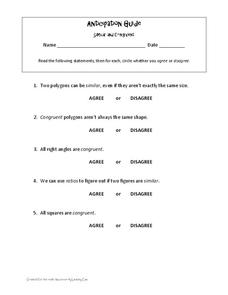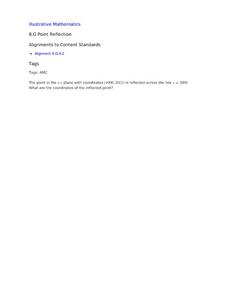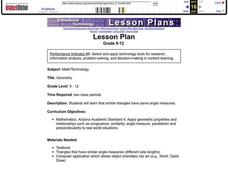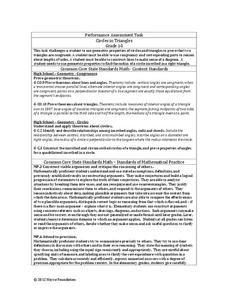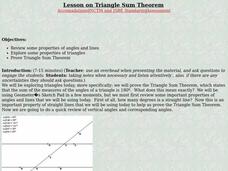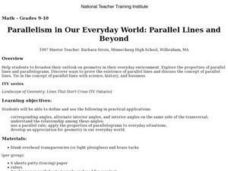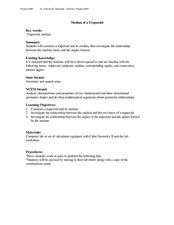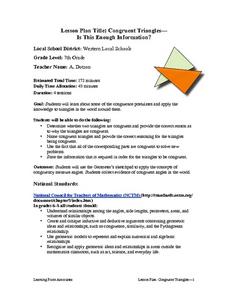Curated OER
The Triangles Problem
In this geometry worksheet, 10th graders explain how two triangles can have 5 parts of the other triangle and still not be congruent. This is a word problem with an answer key.
Curated OER
Challenge: Skills and Applications Lesson 3.4
In this geometry worksheet, students identify the missing angles formed by parallel lines and a transversal. They differentiate between parallel and perpendicular lines. There are four questions.
Mathematics Vision Project
Module 6: Congruence, Construction, and Proof
Trace the links between a variety of math concepts in this far-reaching unit. Ideas that seem very different on the outset (like the distance formula and rigid transformations) come together in very natural and logical ways. This...
Inside Mathematics
Quadrilaterals
What figure is formed by connecting the midpoints of the sides of a quadrilateral? The geometry assessment task has class members work through the process of determining the figure inscribed in a quadrilateral. Pupils use geometric...
Utah Education Network (UEN)
Finding Missing Lengths of Similar Triangles
Middle and high schoolers explore the properties of similar triangles. In this geometry lesson plan, pupils play a similarity basketball game, sketch similar triangles, and find the missing measures of similar figures. They find the...
Curated OER
Finding the Area of an Equilateral Triangle
The problem seems simple: find the area of the equilateral triangle whose sides are each length 1. In fact, this same problem is solved in 8th grade, addressing a different Common Core standard, using the formula for area of a triangle...
Massachusetts Department of Education
Similarity through Transformations
Create the ultimate miniature golf course. The 93-page model curriculum unit from the Massachusetts Department of Elementary and Secondary Education contains nine lessons on understanding similarity in terms of both Euclidean geometry...
Willow Tree
The Pythagorean Theorem
There isn't a more popular geometry formula than the Pythagorean Theorem! Learners understand the special side relationships in a right triangle. They use the Pythagorean Theorem to find missing sides and to solve problems. They begin...
Curated OER
Anticipation Guide: Similar and Congruent
Find out what your mathematicians know about similar and congruent figures with this anticipatory guide that includes five agree or disagree with statements.
Curated OER
Proving Lines Parallel Multiple Choice
In this geometry worksheet, students identify parallel lines, examine and interpret diagrams, and find the value of corresponding angles and lines. This one-page worksheet contains 6 multiple-choice problems. Answers are...
Curated OER
List of Geometry Terms
In this angle vocabulary card worksheet set, students identify the vocabulary associated with angles such as: ray, vertex, acute angle, segment bisector, and corresponding angles. They identify 23 terms but there are no questions...
EngageNY
Complex Numbers and Transformations
Your learners combine their knowledge of real and imaginary numbers and matrices in an activity containing thirty lessons, two assessments (mid-module and end module), and their corresponding rubrics. Centered on complex numbers and...
Curated OER
Why Does ASA Work?
Your geometry learners explore Angle-Side-Angle congruence in this collaborative task. The sum of the interior angles of all triangles being one hundred eighty degrees, is the key learners will discover as they explain their reasoning...
Curated OER
Point Reflection
Use this task as an exit ticket for your eight graders during the geometry unit. All they need to do is identify the coordinates of a point reflected over y=2000.
Virginia Department of Education
Properties of Quadrilaterals
What type of quadrilateral is that? Discover the difference between the types of quadrilaterals. Small groups investigate types of quadrilaterals using geometry software to find their properties. To keep track of the different...
Inside Mathematics
Circles in Triangles
Challenge the class with inscribed circles in triangles. The assessment task requests class members use their knowledge of circles and right triangles to prove two triangles are congruent. They go on to utilize their knowledge of...
Curated OER
Triangle Sum Theorem
Tenth graders investigate the theorems of angles and lines to prove triagle sum theorem. In this geometry lesson, 10th graders discuss the theorems of triangles and how it is used to solve for missing sides or angles. They review how two...
Curated OER
Parallelism in Our Everyday World: Parallel Lines and Beyond
Students broaden their outlook on geometry in their everyday environment. They explore the properties of parallel lines and parallelograms and discover ways to prove the existence of parallel lines and discuss the concept of parallel lines.
Curated OER
Median of a Trapezoid
Students find the median of trapezoids and other polygons. In this geometry lesson, students identify important properties of trapezoids. They create trapezoids and polygons using Cabri software.
Curated OER
Constructing Parallel and Perpendicular Lines
In this geometry worksheet, students construct lines that are parallel and perpendicular forming different angles. They differentiate between interior and exterior angles. Students identify the angles formed by a transversal and...
EngageNY
Informal Proof of AA Criterion for Similarity
What does it take to show two triangles are similar? The 11th segment in a series of 16 introduces the AA Criterion for Similarity. A discussion provides an informal proof of the theorem. Exercises and problems require scholars to apply...
Curated OER
Congruent Triangles
For this congruent triangles worksheet, 10th graders solve and complete 16 different types of problems. First, they name the corresponding parts of the congruent triangles shown and draw a picture. Then, students list the five ways to...
Curated OER
Congruent Trianges - Is This Enough Information?
Seventh graders determine whether two triangles are congruent and provide an explanation to why they are not. They apply concepts of measurement of angles and collect evidence of congruent angles in the world.










